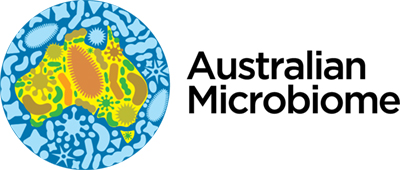Frequently Asked Questions
We strongly value feedback and endeavour to ensure the initiative is a truly inclusive and national collaboration and the genomics resource we are building can be used broadly.
If you have any feedback, comment or query related to the Australian Microbiome initiative, please contact the Project Manager.
FAQs
| Q. How can I get involved? The Australian Microbiome consortium welcomes all researchers with interest in environmental microbiome to the initiative. Researchers involved in the consortium voluntarily agree to adhere to some requirements and policies (Data use and Communications). Please familiarise yourself with these on the protocol page of the website. You can find further information on how supported activities are selected through the first call for proposal. You can view existing supported activities that may be of interest on the research page. Data is publicly available on the Bioplatforms Data Portal. If you would like to get involved, please contact the Scientific Lead and the Project Manager to discuss further. – Scientific Lead: Andrew Bissett, andrew.bissett@csiro.au – Project Manager: Sophie Mazard, smazard@bioplatforms.com All consortium members are asked to agree and sign the initiative’s Collaborative Agreement. |
| Q. How is the Australian Microbiome initiative funded? How long is the initiative funded for? The Australian Microbiome initiative is funded by Bioplatforms Australia and IMOS through the Australian Government’s National Collaborative Research Infrastructure Strategy (NCRIS), CSIRO, and Parks Australia through the Bush Blitz program supported by the Australian Government and BHP. The consortium receives significant investment from the research community both as cash and in-kind investment. Bioplatforms funding for the project is for 3 years, from 01 January 2019. |
| Q. What is Bioplatforms’ investment in the Australian Microbiome initiative? Bioplatforms investment is in genomics data generation, data storage and project management. |
| Q. What is the initiative governance and how are the initiative decisions made? To ensure proper management of the initiative a structure of executive streams have been established (see consortium page). In addition, the initiative will receive input of external advisors. The Steering Committee provides strategic direction and leadership to the Australian Microbiome Initiative consortium. The Committee ensures the achievement of program objectives by making decisions on matters that impact on the milestones and outcomes agreed in the Australian Microbiome Initiative consortium Collaborative Agreement. The working groups are designed to bring together individuals possessing knowledge of the relevant functional areas as well as expertise in disciplines and will act either individually or collectively to undertake assigned tasks and activities alongside an indicated timeframe of completion for deliverables, in order to achieve the project’s objectives. Each of the groups will engage in broad consultation of the consortium and provide informed recommendations to the Steering Committee. There are currently three working groups: – Scientific coordination – End user strategy – Data management and analytics |
| Q. What contributions are expected of the researchers? Cash and in-kind contributions from the wider research community include sourcing material, preparation of material for genomic sequencing and provision of descriptive metadata for the material (contextual, physical and chemical parameters), development of bioinformatics pipelines for data analysis and data sharing (e.g. contributing to and benefiting from collaborations with other international initiatives). |
| Q. What sources of material should I use if I want to get involved? The Australian Microbiome initiative aims to characterise the diversity and ecosystem service provision of the microorganisms inhabiting natural Australian ecosystems. The focus of the samples we analyse is from “structural” natural environment (such as soil, sediment, water), however, non-structural host-associated microbiome are not included. |
| Q. Can I apply for funding from the Australian Microbiome initiative for my own research? The Australian Microbiome is a nationally-inclusive and collaborative initiative. We do not act as a funding agency and fund individual research projects. The initiative works with the research community to build resources and research capability which will be of benefit. The activities supported through the initiative follows strict criteria (see first call for proposal) and is provided through subsidised access to national Omics facilities that are part of the Bioplatforms network of capabilities. |
| Q. What is the Australian Microbiome initiative Data Policy? Who can access data from my samples if I am part of this initiative? Data from research activities supported through the initiative is made publicly available on the Bioplatforms Data Portal immediately following production. All data is accompanied with rich metadata that describe the source of the sample analysed (provided by the sample submitter). The requirements for access and use of the data, as well as appropriate acknowledgements in communications that arise from the Australian Microbiome initiative consortium’s work are defined in the Data policy and Communication policy. |
| Q. Will I be acknowledged if other consortium members use data from my samples in their publication? All communications (scientific or general publications and presentations) that arise from the Consortium’s work, to the best of our knowledge, will appropriately acknowledge the input of all relevant contributions. The publications should specify the collaborative nature of the project, and authorship is expected to include all those contributing significantly to the work. Authorship for publications will be determined on a case-by-case basis. The requirements for access and use of the data, as well as appropriate acknowledgements in communications that arise from the Australian Microbiome initiative consortium’s work are defined in the Data policy and Communication policy. |
